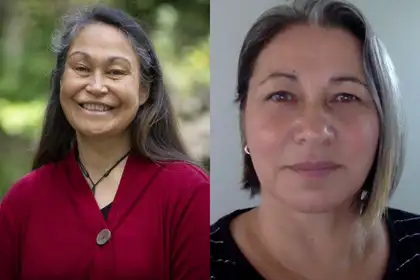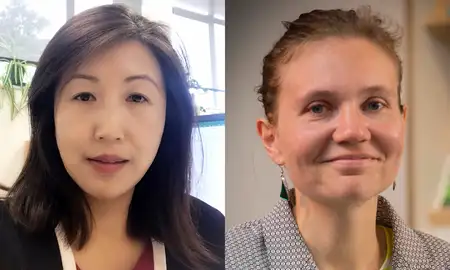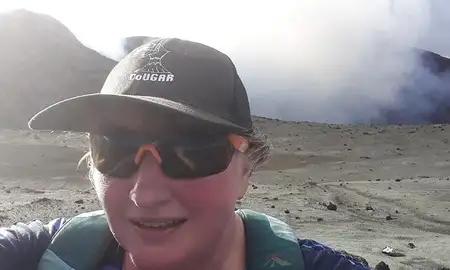
Associate Professor Pania Te Maro and Dr Sharyn Heaton.
Associate Professor Pania Te Maro, Ngāti Pōrou, Te Whānau a Pōkai and Dr Sharyn Heaton, Ngāti Apa ki te Rā Tō, Muaūpoko, Rangitāne, Kai Tahu, Te Arawa, join the prestigious cohort of 2024 funding recipients, contributing to Te Kunenga ki Pūrehuroa Massey University's legacy of grant recipients.
Since 2003, the TLRI has reinforced its commitment to bridging educational research with classroom practice. It aims to enhance the connection between educational research and teaching practice, fostering better outcomes for ākonga in Aotearoa New Zealand.
TLRI funds top-tier research projects designed to improve learner outcomes, all of which involve collaborations between researchers and educators. Supported by the Ministry of Education and administered by the New Zealand Council for Educational Research Rangahau Mātauranga o Aotearoa, TLRI represents a cornerstone in nurturing educational advancements.
Provost Professor Giselle Byrnes says both projects illustrate the key goal of the TLRI, to strengthen the relationship between educational research and teaching practice to improve outcomes for ākonga.
“Exposing students to different knowledge systems, in particular mātauranga Māori, and working in partnership with ākonga to enrich their learning journey is a feature of our university’s strategic goals and these projects translate that ambition into research practice. This is vital research and research that matters.”
Massey’s successful projects
Associate Professor Pania Te Maro is the lead of Equity for Mātauranga Māori in Mathematics Education. This three-year project aims to comprehend current educational practices and needs for equity in mātauranga Māori. Its goal is to design strategies integrating Māori knowledge into mathematics education collaboratively.
Having observed the contrast between mathematics and te ao Māori, Dr Te Maro advocates for the co-existence of mathematical tools and Māori values, and creating space for both.
“Having seen a range of contexts, I could see how we ensure equity for both. There is no false binary. It's about and/and not either/or. Colleagues, teachers and I have trialled some approaches where the purpose of mathematics as a tool, as a hoa haere, and as a way of doing things has been clarified so that Māori ways of valuing and being are given space and maintained.”
Highlighting the positive outcomes of understanding diverse worldviews, Dr Te Maro explains how this approach benefits the exploration of mathematical concepts and aims to make mathematics more inclusive and accessible to all.
“The offshoot of making the differences and similarities in both worldviews and cultures has been beneficial because mathematical ways of doing and being are more carefully unpacked and revealed. Win/win, rather than the current win/lose being suggested. Being able to gather evidence and data will help to uplift mathematics as a knowledge system that is accessible to all and hopefully counter the fear and dislike of mathematics that so many have grown up with and are probably experiencing now.”
The Equity for Mātauranga Māori in Mathematics Education initiative is a partnership between Te Kura ā-Iwi o Whakatupuranga Rua Mano, Te Kura Kaupapa Māori o Whakarewa i te Reo ki Tūwharetoa, Te Whānau o te Arawaru bilingual unit, Te Kura o Hato Hōhepa te Kāmura and Te Kunenga ki Pūrehuroa Massey University.
Dr Sharyn Heaton is the lead of the two-year project Tukua te mātauranga marautanga kia rere. The challenges of integrating mātauranga Māori into a Year 10 and 11 curriculum initiative. This two-year project involves a partnership between Hillcrest High School and Te Kunenga ki Pūrehuroa Massey University.
Dr Heaton says the project aims to mitigate barriers educators face by creating tailored, localised curricula.
“With the release of the NCEA Change 2 policy: Mana ōrite mō te mātauranga Māori in NCEA, many pouako have struggled to integrate mana ōrite and mātauranga Māori into localised school-based curricula, let alone know how to integrate mātauranga Māori across subjects. This two-year longitudinal project explores the processes and practices, highlights and challenges of authentically integrating mātauranga Māori into a localised integrated curriculum for a cohort of Year 10 and 11 ākonga Māori in secondary school. It aims to inform future practice by providing exemplars of how an integrated, localised curriculum could be developed.”
Massey's history with TLRI funding
The TLRI initiative has a rich history of supporting research at Massey University. Associate Professor Tara Way McLaughlin was a funding recipient in 2019 for her project which explored teacher-child interactions in play by focusing on sustained shared thinking. She is also a key collaborator on a current project with Massey graduate Dr Sarah Aiono and a new project led by colleague Sue Cherrington at Victoria University of Wellington.
Dr McLaughlin says the TLRI funding facilitates real-time research that directly impacts educational settings.
“The TLRI is a very competitive but exciting research fund in education because it prioritises projects that are based in partnership with researchers, teachers, leaders and whānau learning from each other, and together with tamariki and ākonga, to create meaningful outcomes. I am thrilled to see the projects for 2024 and a very big congratulations to Associate Professor Pania Te Maro and Dr Sharyn Heaton and their collaborators.”
For a comprehensive view of TLRI's contributions and previous recipients, visit TLRI's official website, which offers insights into the fund's inception, past awardees and its impact on educational research.
Related news
Improving the health of New Zealanders the aim of funded research projects
Two staff members from the Research Centre for Hauora & Health have been awarded grants from Lottery Health Research Te Tahua Tangahau Hauoratanga for projects that will improve the health of New Zealanders.

New project to help better understand food consumers
The Food Experience and Sensory Testing laboratory on Massey’s Manawatū campus has been awarded $1 million by Fonterra for a three-year project investigating better methods to predict consumer responses to food products.

New funding awarded to pioneering research strengthening volcanic resilience
New funding from Toka Tū Ake Earthquake Commission (EQC) has been awarded to a first-of-its-kind research project on infrastructure resilience to volcanic activity, led by Associate Professor Carol Stewart.
